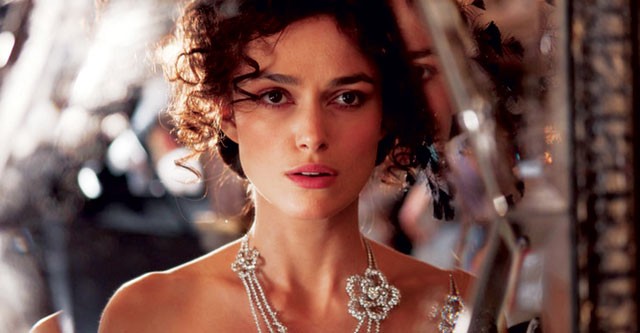Does Tolstoy really matter anymore? Directors regularly attempt to plunder the great master's musty catalog, among which the sweaty, love-drenched Anna Karenina ranks as one of the greats. The latest take on the doomed romance of poor dear Anna is a visually stunning, audaciously arty attempt to overwhelm us with a fury of technique and artifice, which may very well sweep viewers into its florid world of forbidden desires, gloriously blustery Russian winters, and endless layers of bureaucratic frippery.
Will the complicated social imperatives and moral concerns of 19th century Russia remain relevant to 21st century Americans? I ask because, after sitting through director Joe Wright's epic, bedazzling, and faintly numbing interpretation of the venerable favorite, I'm not sure if the problem is the razzle-dazzle or the substance underneath it.
More often than not in recent years, Anna Karenina has been adapted into TV serials, with multiple installments needed to properly contain the voluminous novel's many expansive side plots, philosophical musings, and meandering narrative. No such luck here, as the storytelling has been condensed into a busy rush of incidents, sets, and moments, like a hundred rapidly spinning teacups hanging in the air.
Director Joe Wright (Atonement) is less interested in Tolstoy's fixations on religious symbolism and the virtues of the simple agrarian lifestyle than he is in delivering a good old bodice-ripper. What's left is the skeletal framework of a doomed romance between married socialite Anna (Keira Knightley) and the dashing young officer Count Vronsky (Aaron Taylor-Johnson), a scandalous affair that leaves lives in ruin.
The trouble is that Wright and screenwriter Tom Stoppard have chosen to frame the whole thing inside a theatrical device in which most of the action occurs on a theatre stage, with gorgeous sets and props whizzing by as the camera swoops in around and over the players. When we get exterior scenes, they are deliberately artificial, high-contrast pieces of showy design work, which impress but don't invite. This approach is inventive and intriguing, but it only adds distance between us and the already somewhat formal and remote characters, who the actors try to force into life.
Knightley is Joe Wright's go-to gal, having teamed up with him in Atonement and Pride & Prejudice, but this may have been too many trips to the same well. The preternaturally slim and porcelain Knightley does most of her acting with her upper lip, which quivers wildly, as if she had an electric toothbrush permanently buzzing over her gums. As Vronsky, the youthful Taylor-Johnson (title character of Kick-Ass) is appropriately handsome but lacks authority; he feels a bit out of place in a period piece, and seems to always be looking for a cue card.
The surprise is Jude Law, who has morphed from dashing leading man into playing roles like the drab, bloodless Tsarist functionary Karenin, Anna's cuckolded but defiantly proud husband. Behind his thick, bristly beard, Law takes an intentionally stiff, boring character and makes him vital and alive, a tricky feat that seems just out of reach for everyone else involved.
For all its creativity and cosmetic excitement, this new Anna seems to be merely slapping a new façade on an old barn. There is just enough air between the characters and our sense of reality to make their dilemmas about morality, duty and status seem as quaintly antiquated and rare as a Faberge egg.
Anna Karenina
★★ ½ (out of 5 stars)
Dir. Joe Wright; writ. Leo Tolstoy, Tom Stoppard; feat. Keira Knightley, Jude Law, Aaron Taylor-Johnson (R)


